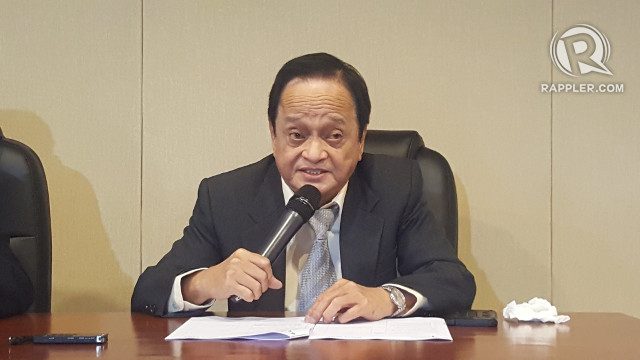SUMMARY
This is AI generated summarization, which may have errors. For context, always refer to the full article.

MANILA, Philippines – The Consultative Committee (Con-Com) is studying a proposal to insert a provision in the constitution that would give the president the power to declare a state of war if Congress is unable to.
“In the event Congress is unable to convene, the President, as Commander-in-Chief, has the power to declare the existence of the state of war, and shall exercise all powers necessary,” reads the proposed new line.
It was presented to media on Thursday, May 3, during a press conference.
Some Con-Com members proposed adding it to the line existing in the present 1987 Constitution that goes, “The Congress, by a vote of two-thirds of both Houses in joint session assembled, voting separately, shall have the sole power to declare the existence of a state of war.”
However, adding that line is a mere proposal at this point. The Con-Com subcommittee in charge of provisions on the legislative branch has yet to vote on it.
Con-Com member and former justice Antonio Nachura explained the rationale behind possibly adding that line.
“It was pointed out to us that there may be a situation when Congress cannot possibly meet and therefore may not be able to declare such a situation,” he said.
He added that this would even allow the president to “exercise other powers” related to a state of war, including the declaration of martial law.
In the 1987 Constitution, the president can declare martial law by himself but must notify Congress in writing within 48 hours and Congress may revoke the declaration. (READ: Con-Com leaning toward retaining bicameral Congress)
What about abuses?
Asked how the Con-Com proposes to provide a check on a possible abuse by the president of this power to declare a state of war without Congress, Nachura said it’s up to Congress to assert itself.
“Congress itself should provide the safeguard. If Congress can meet at anytime after that, they can undo what the president did,” he said.
But what if lawmakers are placed under arrest by a sitting president in the future, thus rendering them incapable of convening at any point in time?
“That future scenario is possible because of a past incident, that, of course, is possible…. But I don’t think that is probable,” said Nachura.
He was referring to the dictatorship of Ferdinand Marcos during which opposition lawmakers were arrested.
Defining ‘state of war’
How would the proposed constitution then define a “state of war”? Nachura said international agreements with the internationally-accepted definition of war would serve as basis. It would be part of the annotation of the new charter.
But, in general, he said a state of war refers to a state of “invasion” or “actual hostilities.”
He further qualified “actual hostilities” as hostilities of a certain scale.
“Hostilities will be of such magnitude to threaten the very existence of the country,” said Nachura.
However, a declaration of a wilayat by Islamic State-inspired terrorists in Mindanao would not count as a state of war.
“I don’t think that will qualify as a state of war that will require such a declaration,” said Nachura.
In the United States Constitution, only Congress has the power to declare war. The president only has the power to direct military forces after Congress’ declaration. However, this is in the context of declaring war with another state. (READ: Con-Com confident public support for charter change will grow) – Rappler.com
Add a comment
How does this make you feel?
There are no comments yet. Add your comment to start the conversation.